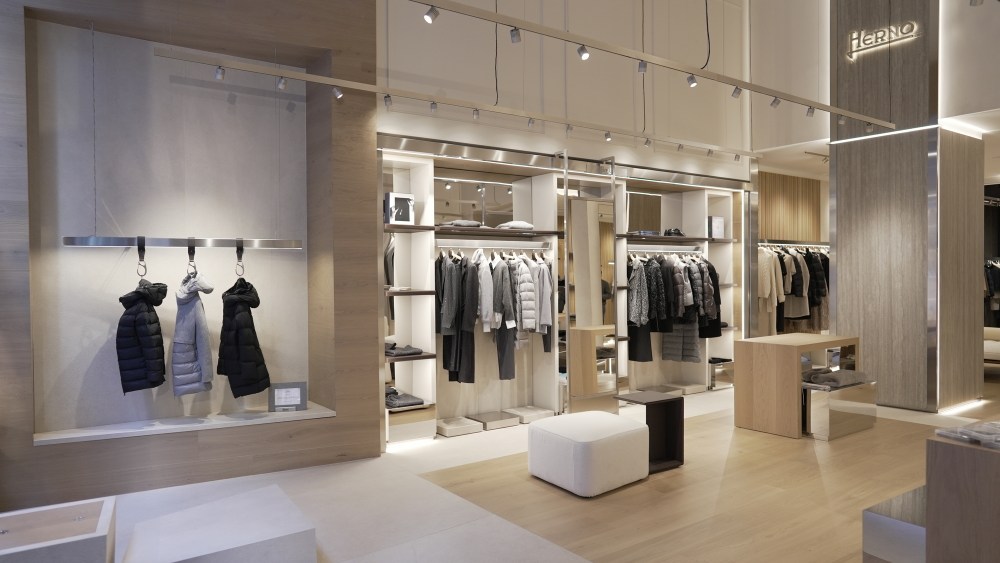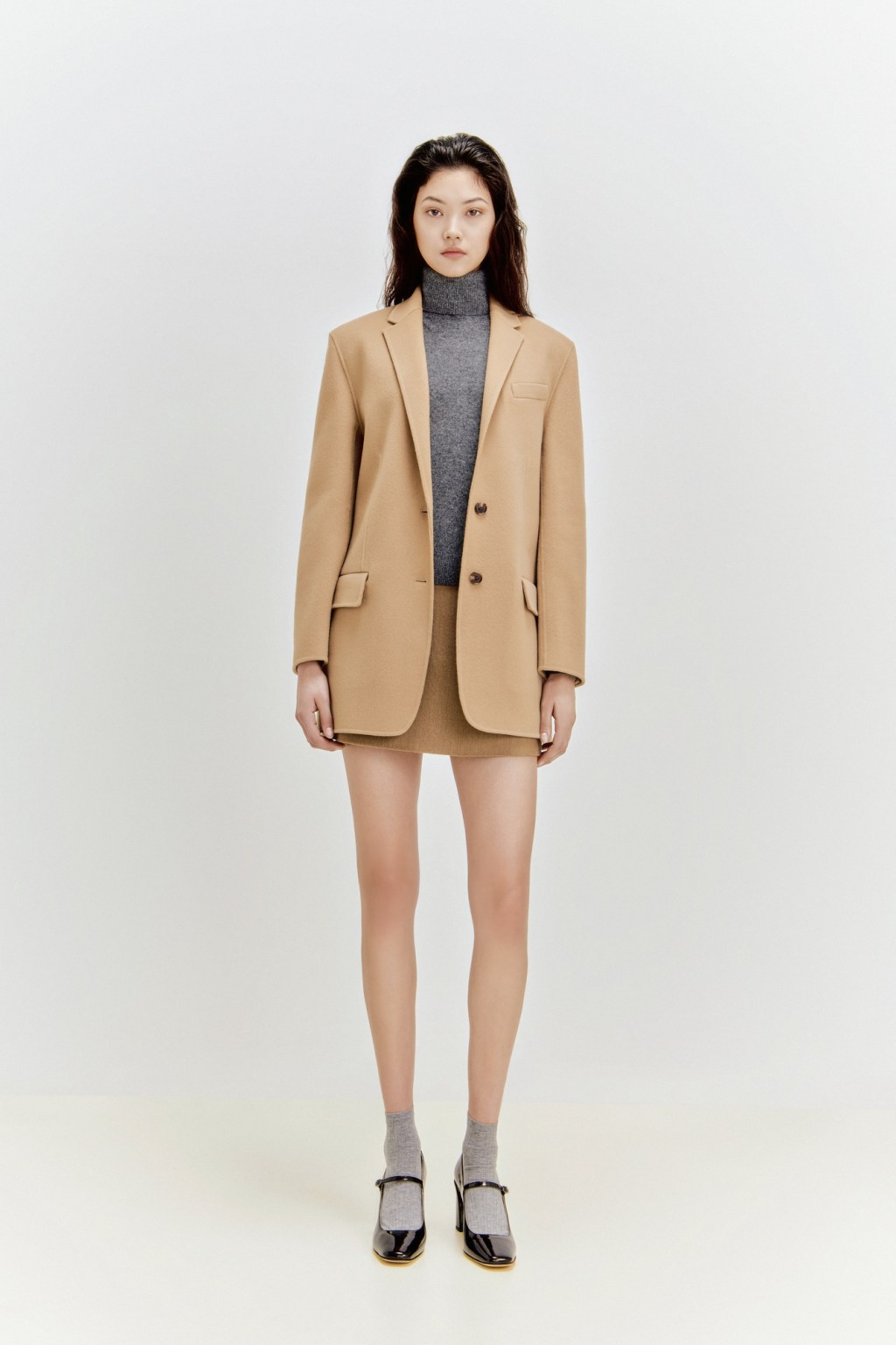NEW YORK — Claudio Marenzi recognizes that when most people think about his brand, Herno, what immediately springs to mind is menswear and outerwear.
So the second generation owner of the Italian luxury brand is on a mission to change that. “The market recognizes us as an outerwear brand that is mainly men’s,” he said at Herno’s new store at 616 Madison Avenue. “But we have more women’s than men’s. We have to rebalance the perception of the brand.”
Marenzi, who was in town to host an opening party at the store, located between 58th and 59th Streets, said the brand now offers sweaters and cardigans, trousers, sweatshirts, T-shirts, polos and even suit separates for both men and women.
Today, outerwear accounts for around 60 percent of the company’s sales in the winter, a number that drops to approximately 50 percent in the warmer months. Bestselling items outside of the core outerwear collection include knitwear — particularly hybrid pieces — and trousers, he said, adding that the popularity of the pants for both genders surprised even him.
You May Also Like
So the message that is being delivered in the new store — as well as through an advertising campaign — is focused on the depth of the product offering.
With Herno’s history, it’s not surprising that it’s best known for its outerwear. The brand traces its roots to Marenzi’s parents, Giuseppe Marenzi and Alessandra Diana, in Lesa, Italy, in 1948. As the story goes, after World War II, Giuseppe lost his job working for an airplane manufacturer and joined a raincoat producer. He applied the skills he had acquired in military aviation by using caster oil, the same substance used in airplane fuel, to make waterproof cotton for the coats.
He opened his own business and soon became the chosen outerwear manufacturer for luxury brands including Giorgio Armani, Prada and many others.
The company chugged along that way until the mid-2000s when those luxury labels started to find other manufacturing options. So when Claudio Marenzi took the helm of the company in 2007, he set out to concentrate on growing Herno rather than producing for other brands.
This shift in focus didn’t sit well with his brothers, who were also part of the brand at the time, but Marenzi was adament that this was the path forward. In 2011, his brothers exited the business and he bought back the 49 percent stake that had been sold to a private equity firm in 2012. Today, he owns 92 percent of the company with his brothers retaining a small 8 percent stake.
While it may have caused angst at the time, Marenzi’s strategy worked and Herno has only one remaining customer, which he declined to name, for whom it produces a limited amount of outerwear. The rest of the production is focused on its own product.
The new store, which is around 525 square feet, is located inside the General Motors building and boasts a new design that is intended to bring a feeling of Italy to the U.S.

The facade features windows that are over 23 feet high and a highly visible logo. The store joins neighbors including Balenciaga, Kiton, Tom Ford, Celine, Brunello Cucinelli and other high-end brands.
A tapered archway draws customers inside the Herno store where they are encouraged to relax in the sophisticated environment. The floors are parquet, steel beams hold the garments which are merchandised on wood and leather hangers, and the display tables, which are made from wood with a mirriored section of metal, are reminiscent of old trunks.
It is divided into three spaces: women’s, men’s and a lounge in the rear. The walls of the women’s department are a desert peach colored Matera stone and there are mirror-lined closets, designed to resemble bookcases, that offer the breadth of the collection. The men’s area is a contrast to the lighter women’s department with its dark Piasentina stone with white veins.
The lounge, or privé, is home to the most luxurious pieces of the collection for both men and women. Here, walls alternate between canneté wood and grooved travertine and are intended to resemble raindrops, a nod to the brand’s history. The room is designed to offer a private and intimate shopping experience.

The space also includes large LED walls where the brand can project content to bring its messaging to life.
“I’m very happy with this shop,” Marenzi said. “It shows the best of our collection.” He stressed that everything sold in the space is produced in-house to ensure the highest quality is maintained. “That’s very important for our homogenization,” he said. “Now, we have to make the customer understand what we stand for.”
The design of this store is new for the company, which continues to operate a unit in SoHo on Greene Street that opened in 2017. It also has an outlet at the Woodbury Common mall in Central Valley, N.Y. The SoHo unit was given a facelift as well to incorporate some of the design elements of the Madison Avenue unit, and while it offers the entire collection, the uptown store has more of the luxury pieces, which Marenzi hopes will draw the well-heeled customers that call the neighborhood home.
“This is the place to be in New York,” he said. “There are more tourists in SoHo.”
All told, Herno operates 50 stores around the world with locations in most of the big European cities including Rome, Milan, Madrid, Barcelona, Paris, London, and Munich. The remaining stores are in Japan, which are directly operated, and Korea where it works with a partner.
The Madison Avenue store is also designed to better showcase Herno’s product offering to its wholesale customers. “We remain one of the biggest wholesalers with 1,800 customers worldwide — the best shops in the world,” he said. “This store can show our wholesale accounts everything we do.”
Ditto for a new showroom that the brand opened a year ago in Milan. “It’s much bigger than our older showroom and allows us to show the collection all together.”

Marenzi acknowledged that it will take time to get the word out about the range of products offered by the company, and he’s willing to invest in communication to drive the point home. “It’s like a farmer,” he said. “You put in the seeds and wait for it to grow.”
In terms of volume, Herno expects the brand to have sales of around 180 million euros this year, a sharp increase from the 5 million euros it had tallied in 2005, 4 million of which came from its manufacturing arm and 1 million from Herno.
Looking ahead, Marenzi said there are no plans to add stores in the immediate future. Instead, he will focus on increasing the profitability of the existing fleet.
And while he said there are also no plans to bring on outside investors right now, it may one day be inevitable. “The world is changing and you can’t grow without financial partners,” he said. “For now, I can still run it alone and in the future, we’ll see. But I’m in no hurry.”



